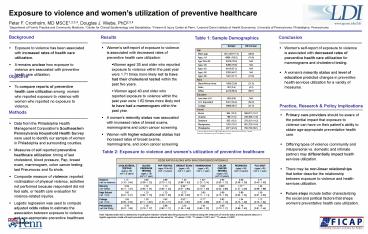Exposure to violence and womens utilization of preventive healthcare - PowerPoint PPT Presentation
1 / 1
Title:
Exposure to violence and womens utilization of preventive healthcare
Description:
... pressure, Pap, breast exam, mammogram, colon cancer testing; last Pneumovax and flu shots. ... more likely not to have had a mammogram within the past year. ... – PowerPoint PPT presentation
Number of Views:23
Avg rating:3.0/5.0
Title: Exposure to violence and womens utilization of preventive healthcare
1
Exposure to violence and womens utilization of
preventive healthcare
Peter F. Cronholm, MD MSCE1,2,3,4, Douglas J.
Wiebe, PhD2,3,4 1Department of Family Practice
and Community Medicine, 2Center for Clinical
Epidemiology and Biostatistics, 3Firearm Injury
Center at Penn, 4Leonard Davis Institute of
Health Economics, University of Pennsylvania,
Philadelphia, Pennsylvania
Background
Conclusion
Results
Table 1 Sample Demographics
- Womens self-report of exposure to violence is
associated with decreased rates of preventive
health care utilization - Women aged 35 and older who reported exposure to
violence within the past year were 1.71 times
more likely not to have had their cholesterol
tested within the past five years. - Women aged 40 and older who reported exposure to
violence within the past year were 1.62 times
more likely not to have had a mammogram within
the past year. - A womans minority status was associated with
increased rates of breast exams, mammograms and
colon cancer screening. - Women with higher educational status had
increased rates of breast exams, mammograms, and
colon cancer screening
- Exposure to violence has been associated with
increased rates of health care utilization. - It remains unclear how exposure to violence are
associated with preventive health care
utilization.
- Womens self-report of exposure to violence is
associated with decreased rates of preventive
health care utilization for mammograms and
cholesterol testing. - A womans minority status and level of education
predicted changes in preventive health services
utilization for a variety of measures.
Objective
- To compare reports of preventive health care
utilization among women who reported exposure to
violence with women who reported no exposure to
violence.
Practice, Research Policy Implications
Methods
- Primary care providers should be aware of the
potential impact that exposure to violence can
have on their patients ability to obtain
age-appropriate preventative health care. - Differing types of violence (community and
interpersonal vs. domestic and intimate partner)
may differentially impact health services
utilization. - There may be non-linear relationships that better
describe the relationship between exposure to
violence and health services utilization. - Future steps include better characterizing the
social and political factors that shape womens
preventative health care utilization.
- Data from the Philadelphia Health Management
Corporations Southeastern Pennsylvania Household
Health Survey were used to identify our sample of
women in Philadelphia and surrounding counties. - Measures of self-reported preventive healthcare
utilization timing of last cholesterol, blood
pressure, Pap, breast exam, mammogram, colon
cancer testing last Pneumovax and flu shots. - Composite measure of violence reported
victimization of physical violence, activities
not performed because respondent did not feel
safe, or health care evaluation for
violence-related injuries. - Logistic regression was used to compute adjusted
odds ratios to estimate the association between
exposure to violence and age-appropriate
preventive healthcare utilization.
Table 2 Exposure to violence and womens
utilization of preventive healthcare































